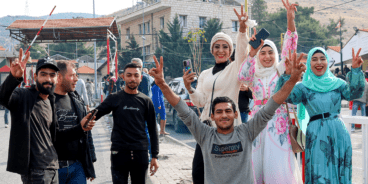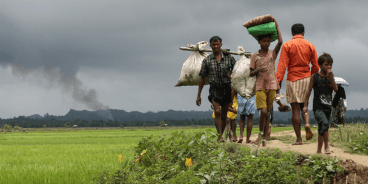
Airstrikes and Impunity for Chemical Weapons Use in Syria
In the early hours of Saturday, 14 April, the United States, United Kingdom and France launched airstrikes against the armed forces of the Syrian government. The United States, United Kingdom and France have stated that their military operations were in response to a 7 April suspected chemical weapons attack by Syrian government forces on the town of Douma in eastern Ghouta. That attack killed at least 70 people, including children, with more than 500 people being treated for exposure to toxic chemicals. The Syrian and Russian governments have rejected all evidence of the horror in Douma as fabricated.
Chemical weapons are inherently immoral, indiscriminate and illegal. Using them constitutes a war crime and their prohibition is one of the oldest norms of the international community, dating back to 1899 and reinforced by the Geneva Protocol of 1925. This prohibition was further strengthened by the 1997 Chemical Weapons Convention of which 192 states, including every member of the UN Security Council, is a signatory.
Three years ago, in a rare moment of unity, the UN Security Council unanimously adopted Resolution 2235 establishing the Organization for the Prohibition of Chemical Weapons-Joint Investigative Mechanism (OPCW-JIM) to investigate and attribute responsibility for chemical weapons attacks in Syria. Despite Syria agreeing in August 2013 to surrender all its chemical weapons, the government has continued to regularly use such weapons. For example, chlorine gas has been used against civilians in eastern Ghouta at least seven times prior to the attack on Douma last week.
In October and November 2017 Russia vetoed three resolutions that would have enabled the OPCW-JIM to continue its crucial work. This past week it also vetoed another resolution that would have established an independent investigation of the attack in Douma. In all, twelve vetoes by Russia since 2011 (including six double vetoes with China) have shielded perpetrators of atrocities in Syria from accountability and prevented the international community from upholding its responsibility to protect.
The UN Security Council’s failure to act has helped to normalize chemical warfare in Syria. However, the Global Centre for the Responsibility to Protect does not condone military action outside of international law.
Today’s airstrikes represent a new and dangerous phase of the Syrian conflict. In response, the international community should formally request that the UN investigate chemical weapons attacks in Syria and determine who is responsible, utilizing the existing “Secretary-General’s Mechanism for Investigation of Alleged Use of Chemical and Biological Weapons.” The pursuit of justice via the International, Impartial and Independent Mechanism to assist in the investigation of atrocities in Syria, established by the UN General Assembly, also remains essential. All those responsible for war crimes and crimes against humanity in Syria must be held accountable and punished in accordance with international law, regardless of their position or affiliation.
Seven years of conflict have killed more than half a million people in Syria and delivered nothing but misery for its people. Seven years of vetoes have obstructed diplomatic efforts to end atrocities in Syria and weakened international law. Despite inevitable tensions arising from last night’s events, the entire Security Council must now work to protect civilians, prevent further military escalation, and take proximate steps to end the civil war once and for all.
Related Publications


Statement on the developing situation in Syria
